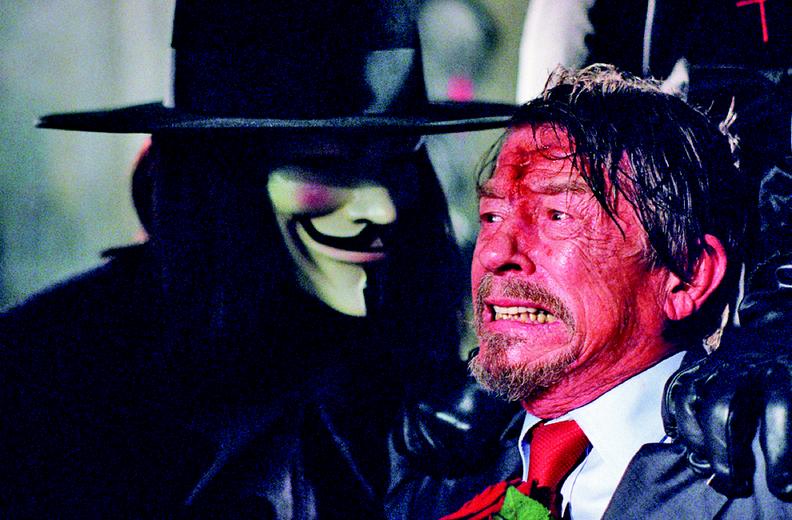Now, on the heels of a couple not-quite-successes (From Hell, The League of Extraordinary Gentlemen), comes another bold attempt to adapt one of Moore's cult writings. This time around, it's not just Moore's reputation that's on the line. The feature film version of V for Vendetta marks the first cinematic offering from the infamous Wachowski brothers since the conclusion of their Matrix trilogy. Many people–even loyal Matrix fanatics–expressed growing exasperation with the Wachowskis as their multimillion-dollar Matrix series devolved into technomystical mumbo jumbo and self-indulgent sidetracking. V for Vendetta is a make-or-break moment for the duo. Have they still got it? … Well, let me put it this way: I take back every bad thing I ever said about those boys.
This time around, the Wachowskis turned directing duties over to James McTiegue (an assistant director on the Matrix films as well as Star Wars: Episode II) and retained their own services as writers. They had their work cut out for them. Moore and Lloyd's graphic novel is both unconventional and controversial. How to hone the sprawling series and still retain its rebellious flair?
Hugo Weaving (Agent Smith in The Matrix films, Elrond in the Lord of the Rings films) stars as the titular character, a futuristic freedom fighter who hides behind an iconic Guy Fawkes mask (not to worry, Americans, V for Vendetta starts off with a short history lesson to get us up to speed). Like the legendary anarchist Fawkes, our man V seems intent on blowing up the houses of Parliament. Yes, he's a terrorist. And, yes, he's the good guy.
You see, in this near-future world, the United States is in the midst of a civil war and England has been taken over by an ultraconservative political party. Britain's population is kept fearful and needy under the watchful, Big Brother-ish eye of Prime Minister Adam Sutler (John Hurt) and his neofascist government.
Into this eerily familiar world of terrorist alerts, wiretapping and interrogation camps comes V, a flamboyant, Shakespeare-quoting swashbuckler armed with a set of razor-sharp knives. One night, he rescues a timid television station intern named Evey (Natalie Portman) from the clutches of some abusive policemen. In this girl, our hero recognizes some spark of kinship. He takes her to his underground lair (filled with censored books and banned artwork), and sets about teaching her The Truth.
Almost every element in V for Vendetta is taken directly from the original graphic novel. Some fanboys may argue with me, and Moore himself would almost certainly punch me in the gob for saying so, but the Wachowski's streamlined script actually improves on the original comic. Obviously, the script has been modernized to reflect the current geopolitical climate. Still, Moore's “power to the people” arguments are even more relevant in today's post-9/11 world than they were when Reagan was battling the Evil Empire. (Hell, we've got a whole Axis of Evil these days.) A slightly reorganized storyline builds even more effectively upon the mystery of V's past. Who is he? What is he? Why does he want to destroy the government? Aside from the Sci-Fi Channel's “Battlestar Galactica,” I can't think of a work of fiction that so seamlessly melds popcorn-munching thrills with thought-provoking political discourse.
V for Vendetta does advance some truly radical notions. I wonder how mainstream America will react to the positive portrayal of armed insurrection and anarchy. (To say nothing of a hero who is so aggressively literate.) Still, the film presents a convincing and cogent argument. “People should not be afraid of their governments,” says V. “Governments should be afraid of their people.”
Those in it for the action won't be disappointed. The film isn't nearly on the level of The Matrix and its bullet-time innovation. There's a lot of talk in V and only a handful of actual fight scenes–but they're worth the wait. The final showdown (a jaw-dropping knives versus handguns ballet) is bloody excellent (in several senses of the word).
V for Vendetta is a film that dazzles the senses and challenges the mind. The script is smart and edgy. The cast (particularly Weaving, who expresses volumes without ever showing his face) rises to the occasion. As a director, McTiegue crafts some memorable visuals. A scene with a roomful of toppling dominoes is among the film's most exciting images, leading directly to the explosive, unforgettable finale. I'll say it now: One of my favorite films of the year.



